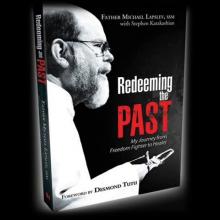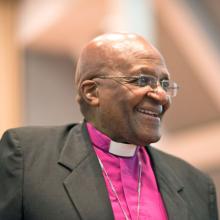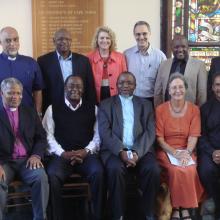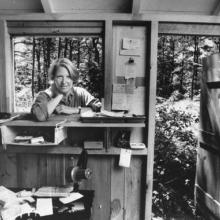These magazine articles and blog posts published by Sojourners through the years pay tribute to the great South African leader.
Apartheid
NELSON MANDELA was the most important political leader of the 20th century. While Roosevelt and Churchill helped protect the West and the world from Hitler’s Nazism, Mandela heroically exemplified the movement against the colonialism and racism that oppressed the global South, shown so dramatically in South Africa’s apartheid. And from a Christian point of view, he combined justice and reconciliation like no other political leader of his time, shaped by the spiritual formation of 27 years in prison.
Shortly after Mandela was released from prison, he came to New York to meet with a small group of Americans who had been involved in the anti-apartheid struggle, and I was blessed to join them. From the start, I felt in Mandela a moral authority I have never experienced with any political leader.
Attending Mandela’s inauguration in 1994 was a highlight of my life. We were picked up at the airport by friends, a couple who had both been in prison and tortured, but now she was about to become a member of the new South African parliament. We saw a group of the infamous South African security police. Having been interrogated by these thugs before, I immediately said, “Let’s get out of here!” To which they replied, “Don’t worry, Jim, they’re ours now.”
At the ceremony, joined by my South African friends, we watched Nelson Mandela announce his vision for a new rainbow nation. More than 100,000 people (and a billion or so more via TV) listened with tears in their eyes and great hope in their hearts.
Nelson Mandela turned 95-years-old today and in honor of his parity work throughout South Africa, people of all races are joining together and celebrating his legacy in the form of song and offerings. Although Mandela spends this year's birthday under close medical attention, hospital officials believe his condition is improving. The New York Times reports:
On Thursday, hundreds of people gathered outside the Pretoria hospital where Mr. Mandela has been treated for the past 40 days. Officials from the African National Congress brought a birthday cake, while well-wishers added more posters and flowers to the mountain of tributes outside the hospital, ululating and breaking out into freedom songs from the struggle against apartheid.
Read more here.
Mr. Venter’s question is a constant thought during these declining days of Nelson Mandela’s life, especially today — his 95th birthday. I pray daily for my South African daughter Eliza, husband Jonathan, and their four sons Noah, Aidan, Luke, and Sam, along with the many dear South African friends gathered over the past 30 years. Will they live the on-going dream or in an emerging nightmare?
In 1994, during Bill Clinton’s presidency, I had the honor of meeting President Nelson Mandela in a most unexpected way — just two months after his April inauguration as the first democratically-elected President of South Africa.
Conversations in Transition is a veritable graduate course in what South Africans call ubuntu, or good neighborliness.
Charles Villa-Vicencio and Mills Soko present 23 narratives of both well-known and unsung heroes of the anti-apartheid struggle. These narratives are filled with instructive words of wisdom for seekers of peace with justice in countries emerging from post-tyranny chaos and in long-established democracies alike. Historians and activists will find hope in the stories of South Africa’s courageous, diverse citizens, as well as prophetic insights and warnings as the subjects address post-apartheid violence and oppression in a country still on the edge.
My own experiences lead me to an unqualified endorsement of this invaluable compendium. Over several decades I have pondered repeatedly two particular conversations, one with a Jew in Israel and the other with a Muslim from Cape Town.
An effort was made to introduce the Truth and Reconciliation Commission (TRC) process into the Israel-Palestine conflict. At the end of an evening with South African officials and members of the Israeli and Palestinian communities, the director of a Jewish study center in West Jerusalem, Benjamin Pogrund, shared a revealing comment. He said, “TRC will never work here because Israelis do not have the theological and philosophical understanding of forgiveness and reconciliation that Muslims, Christians, and Jews shared in South Africa in order to bring unity and liberation without major conflict.”
Most Americans sat glued to the TV or radio on April 15 (or raced to finish tax returns) transfixed by the horrific Boston Marathon bombing and aftermath. Nearly 100 friends of Fr. Michael Lapsley’s gathered that evening at Busboys and Poets restaurant and bookstore in Washington, D.C., to be soothed with a testimony of faith by South African Ambassador Ebrahim Rasool, soul-stirring cello music, and a transporting testimony of healing by apartheid regime bomb victim “Father Mike.”
One of my favorite newspapers in the world, the South African Mail and Guardian, reported on April 19 this way:
“Boston bombings: the marathon struggle of survival and healing … a priest from South Africa, apartheid fighter and a bomb victim himself reaches out to Americans about forgiveness … He had not planned it that way. The event was to launch his book. It had been scheduled for last October but Hurricane Sandy scuppered those plans. Instead it took place on a day when three people were killed and more than 100 injured in Boston.”
Desmond Tutu, the former Anglican archbishop of Cape Town, South Africa, who won a Nobel Peace Prize for his battle against apartheid, has won the 2013 Templeton Prize, which is billed as the most significant award in the field of spirituality and religion.
Tutu, who has not been afraid in recent years to criticize leaders in his country and across Africa for humanitarian and political shortfalls, was cited for his work in advancing the cause of peace and the spiritual principles of forgiveness.
“By embracing such universal concepts of the image of God within each person, Desmond Tutu also demonstrates how the innate humanity within each of us is intrinsically tied to the humanity between all peoples,” Dr. John M. Templeton, Jr., the president and chairman of the John Templeton Foundation, said in a video statement released Thursday announcing the $1.7 million award.
Having achieved our freedom we can fall into the trap of washing our hands of difficulties that others face. We would be less human if we do so…we know too well that our freedom is incomplete without the freedom of the Palestinians.
- President Nelson Mandela- December 1997
There is visceral identification by South Africans with the suffering of the Palestinians.
Newspapers and speakers at South Africa Human Rights Day/U.N. International Day for the Elimination of Racial Discrimination focused on the liberation of the oppressed and the importance of a mobilized civil society to stand with the marginalized. The events commemorate the nonviolent protest against the racial passbooks, March 21, 1960. The day ended tragically with the Sharpeville massacre, which left 69 people dead and 180 injured. Nelson Mandela burned his discriminatory passbook a week later and the long march for freedom and dignity began in earnest. Even when it is still a journey in progress of real equality and democracy for all, there is an intentionality expressed best by Mandela.
When Frederick Douglas assembled with other representatives at the National Colored Convention of 1853, they collectively condemned the nationwide epidemic of racial discrimination. As the gathering intended to discuss the circumstances and possibilities of “coloreds” (as they were called then), they recognized the various ways that “scorn and contempt” were heaped upon them — for no justifiable reason — by the white-skinned racial majority.
In remembrance of Douglas’ critique surrounding his 19th century “white countrymen,” and in recognition of our annual celebration of Black History Month, we in the U.S. continue to mourn the deep divisions that occur due to racial misunderstanding. In other words, as we take an inventory of race relations roughly 195 years after Frederick Douglas was born, we recognize that racial ignorance among far too many of our citizens continues to result in a disturbing level of collective indifference and social inequality.
In Mandela: An Audio History, the voices of activists, artists, and ordinary citizens unite to tell the powerful narrative of overcoming apartheid through strength and solidarity in South Africa. In this five-part audio documentary, hosted by Desmond Tutu, the weaving of personal interviews, newsreels, and found sounds from Mandela and those around him (both for and against) are highlighted to showcase the watershed story of a 50-year struggle.
CLICK HERE TO LISTEN TO THE FULL SERIES OF AUDIO DOCUMENTARIES
Take a listen to Part One: 1944 –1960
“If art is to nourish the roots of our culture, society must set the artist free to follow his vision wherever it takes him.” ~President John F. Kennedy
Twenty-five years after the release of Paul Simon's Graceland album, the singer-songwriter returned to South Africa to visit the musicians who worked with him on what many believe is his musical masterpiece. A new documentary film, Under African Skies, which premieres tonite (Friday, May 25) on A&E, chronicles Simon's journey and the role that music — and artists — may have played in bringing about the end of apartheid.
This masterful film, which debuted earlier this year to wide acclaim at the Sundance film festival, makes a convincing argument for the important role that artists play in changing the world for the better.
Engaging in international travel to participate in political justice — especially anti-apartheid issues in the Mid East and Africa — is a bit like playing big league baseball. The “player” must submit to an excellent coach, pick a good team, learn the essential rules about foreswearing violence, not getting caught stealing by the opposition, and arrive home safely with limited physical or psychic injury.
One of the “hall of fame” coaches still is Archbishop Emeritus Desmond Tutu who wisely said, “if we had taken up arms when things appeared hopeless in our struggle against apartheid in South Africa we would all be dead and apartheid would still exist.”
The Archbishop was in town last week for a CBS webcast interview along with American Episcopal Presiding Bishop Katherine Jefferts Schori on the “Mission of the Church.” He reinforced that “mission is about receiving the love of God in Jesus and then going to the world to make love incarnate” rather than trying to resolve the world’s terrible conflicts with military interventions.
As an annual visitor to South Africa I am often asked, “will the budding democracy survive or will it go the way of other African dictatorship kleptocracies?”
For starters of course it can be said that all democracies, even America’s in an election year, are works in progress.
But beyond the obvious it is accurate to assert that the model post-apartheid constitution and bill of rights in the early 1990s established a sound foundation. The media and courts remain vibrant and even courageous, African National Congress party discipline is improving, the government is being held accountable for corruption and lack of basic service delivery, and a growing vocal parliamentary opposition is emerging. The grass roots civil society—planted and thriving from the liberation struggle—is active in movements such as Kairos Southern Africa.
After nearly 700 people tried to push Gonzaga University to rescind its commencement speaker's invitation to Archbishop Desmond Tutu, supporters of the anti-apartheid hero responded with 11,000 signatures of their own.
Opponents claim the Jesuit school had lost sight of its Catholic values by inviting the former Anglican archbishop of Cape Town, South Africa, to speak at next month's commencement and receive an honorary Doctor of Laws degree.Now a second petition is circulating, this one protesting the anti-Tutu petition.
Now a second petition is circulating, this one protesting the anti-Tutu petition.
In 1985 the South African writers of the Kairos Document declared the Dutch Reformed Church’s “state church” theology to be heretical because of its justification of apartheid. In the months following, Desmond Tutu and many other anti-apartheid leaders risked their lives for change.
On the 2012 Centenary Celebrations of the African National Congress, 21 years after Nelson Mandela’s release from prison, the Kairos Southern Africa theologians have released, “A Word to the ANC in These Times.” The document boldly calls attention to the “certain contradictions [that] continue to militate against … fully achieving the dream that the injustice … meted out to black South Africans by the colonizers would come to an end.”
The document raised other critical issues, such as diminishing diversity, party factionalism and inappropriate security measures. The authors clearly declared, “A house divided against itself cannot stand.” (Matthew12:25)
The Kairos steering committee met with the ANC executive in a closed meeting February 8. The discussion focused on poor standards of education, unsustainability of an “opulent ‘American dream’ lifestyle, respecting the Constitution of the Republic, and closing the gap between the richest and poorest.
When Sojourners CEO Jim Wallis departed on his three-month sabbatical at the beginning of January, I sent him a list of books, films and music that I thought would nourish his mind and spirit in, perhaps, different ways than the media he normally consumes do.
Jim's sabbatical — a true Sabbath in the literal sense — is designed to be a time of rest and, more importantly, rejuvenation. It will also be a creative time when he will be working on a new book.
Jim is a creative. A writer. A visionary. He regularly digs deep into his heart and soul, breaks himself open and pours out his passion, hope and faith for the edification of others. If creatives aren't diligent, though, we can work ourselves into the ground. Our wells can run dry.
In sending Jim this list of what I like to think of as "soul food," I hoped to inspire his imagination and give him new fuel for the fire, if you will.
Free South Africa, To Love More Deeply, When Disaster Strikes, Wrestling with Tradition.
When I was ordained as a "Minister of Word and Sacrament" in the Reformed Church in America, a denomination that began in 1628, I imagined that I was being ordained to a church that was "reformed and always reforming!" (Emphasis mine).
Reformata et semper reformanda was a theme of the Reformation, which Martin Luther kicked off on Oct. 31, 1517 when he nailed his Ninety-Five Theses to front door of Castle Church of Wittenberg, Germany.
But rather than reviewing history from a half-millennia ago, let me explain what I hoped for 22 years ago, when I was ordained.
If justice is only an implication, it can easily become optional and, especially in privileged churches, non-existent. In the New Testament, conversion happens in two movements: Repentance and following. Belief and obedience. Salvation and justice. Faith and discipleship.
Atonement-only theology and its churches are in most serious jeopardy of missing the vision of justice at the heart of the kingdom of God. The atonement-only gospel is simply too small, too narrow, too bifurcated, and ultimately too private.











